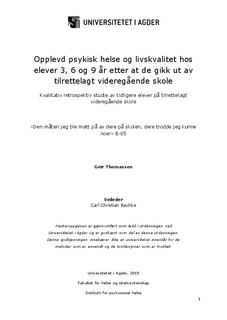Opplevd psykisk helse og livskvalitet hos elever 3, 6 og 9 år etter at de gikk ut av tilrettelagt videregående skole Kvalitativ retrospektiv studie av tidligere elever på tilrettelagt videregående skole «Den måten jeg ble møtt på av dere på skolen, dere trodde jeg kunne noe!» B-05
Master thesis
Permanent lenke
http://hdl.handle.net/11250/2380037Utgivelsesdato
2015Metadata
Vis full innførselSamlinger
Sammendrag
As a teacher at an adaptive organized secondary school for vocational training, I want to examine how former students perceive their mental health (MH) and quality of life (QoL) today. The purpose of the project is to see if the program has positively helped to strengthen their MH and their QoL, some years after leaving school. The research question is, "3, 6 and 9 years after the adapted secondary education - How does the former pupils experience their mental health and quality of life?" The study throws light on four sub-questions.
1. How is your experienced mental health and quality of life today?
2. What have contributed positively to your experienced mental health and quality of life today?
3. What in your past have contributed to your experienced mental health and quality of life?
4. What is it about organized high school that has been influencing your experienced | mental health and quality of life?
I choose interview as a qualitative method. 27 former pupils spread over three classes (2005, 2008, 2011), were asked to participate. Informants had been students at level 2, in a program of child and youth care. Three informants from each class responded positively to participate in the study. The collected information was categorized according to what had contributed to their felt MH and QoL (sub-question 2, 3 and 4). To answer question 1. a Likert scale from 1-10 was used to measure their level of MH and QoL today.
Concerning sub-question 1, informants replies with an average of experienced MH 7.3, and QoL 7.7, on a scale where 10 being the highest score. Class -08 scored averagely highest.
On sub-question 2. and 3. the conclusions are family, friends, work, leisure and good health contributed to informants` MH and QoL means a lot both today and in the past. These findings are similar to what contributes to MH and QoL in the general adult population in Norway (Næss, 2011). On sub-question 4. The informants relate to the relationship with staff and peers and experience of mastering the training offered by the organized secondary school as reachable for their MH and QoL.
Keywords: Mental health, quality of life, facilitated education, retrospective study, relationships, coping.
Beskrivelse
Masteroppgave psykisk helsearbeid- Universitetet i Agder, 2015
